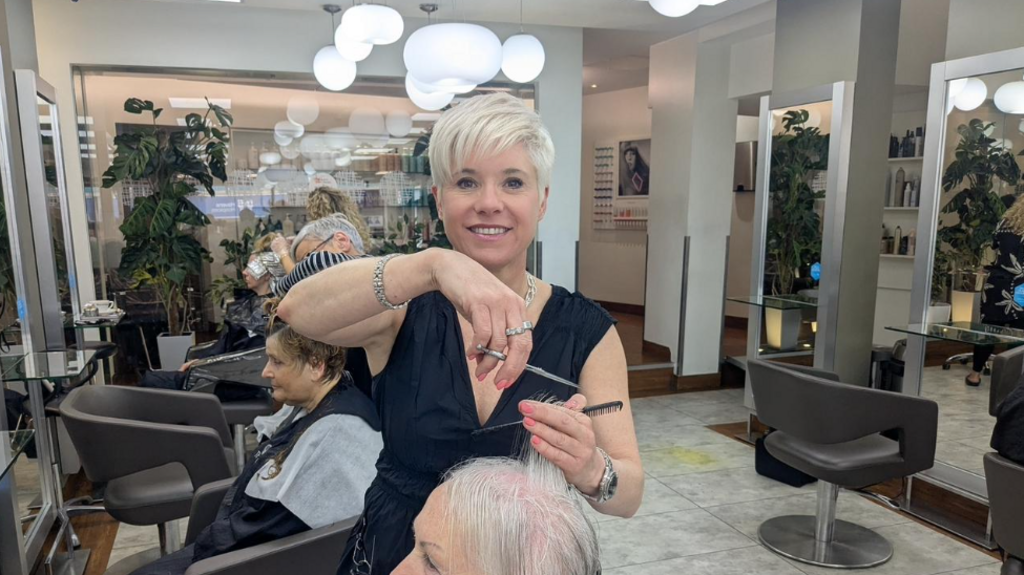“I never aspired to anything other than being a hairdresser,” said Kerry Larcher, who launched her first salon at the age of 21.
After three decades building her business in Hornchurch, East London, the 50-year-old now risks losing both her company and her home.
Larcher warns that tax increases from October’s Budget are “crippling” her salon, with the additional £23,000 per year ushered in by the chancellor posing a dire threat to both her business and livelihood.
“Since October, this has been the most difficult period of my personal life in 30 years—I’ve cried myself to sleep over it,” she revealed.
“It’s embarrassing to be in debt, yet we’re steadily exhausting our business reserves. If I don’t turn a profit, I can’t pay myself.”
“Should the business fail, I risk losing my home. That’s the hard truth, and unless things shift soon, it frightens me deeply.”
The government has stated that the tax changes introduced by Chancellor Rachel Reeves are necessary to ensure economic stability.
Officials say their plans to reform business rates will lower the tax burden for High Street outlets, including salons, starting in 2026-27.
However, many salon owners worry these changes may arrive too late to save their enterprises.
As she attended to a client, Kerry explained that she could not afford to recruit new apprentices this year and was forced to cut the hours of her 12 current apprentices to the minimum.
She anticipated halving apprentice numbers over the coming year as contracts expire, likely reducing to six apprentices by the year’s end.
Unless the business improves within the next four years, the remainder of her 28-person team—primarily local women who trained and qualified at the salon—could face redundancy.
“To remain viable, I’ve had to cut my workforce dramatically,” she said.
“Where will the next generation of hairdressers come from if established, reputable salons can’t survive?”
Kerry also argued that, given salons predominantly employ women, the policies introduced by the chancellor run counter to the government’s aims of fostering economic growth and supporting workers.
A significant portion of this strain derives from the UK’s Value Added Tax (VAT) policy, which prevents salons from reclaiming VAT on staffing costs as they can for goods—a challenge for labour-intensive sectors like hair and beauty.
“A café, for example, can have one waiter serve multiple tables in an hour and reclaim VAT on every item sold,” Kerry noted.
“But for salons, each client requires a receptionist, an apprentice, and a stylist during that same time, and we can only reclaim VAT on consumables like hair dye.”
She also pointed out that many hairdressers accrued debt during the pandemic and now face additional pressure from rises in employer National Insurance contributions (Nics) and business rates, raising concerns for the future of salons nationwide.
For The Vanilla Rooms—Kerry’s salon—these taxation increases have resulted in an added annual cost of £23,000, driven by a reduction in the Nics threshold to £5,000 and revised business rates.
Her National Insurance obligation has jumped 29%, rising from around £42,000 to £54,500 (now exceeding £1,000 per week), while business rates soared by 144%, from nearly £7,000 to about £18,000 a year.
Kerry is one of approximately 50,000 UK hairdressing professionals represented by the British Hair Consortium (BHC), which has urged the chancellor to act to prevent what it fears could be the “collapse” of the industry.
The BHC contends that cutting VAT for salons by half would provide the most effective support, especially as staff wages comprise 60% of their expenses.
It argues that this move could potentially boost the overall tax yield by discouraging a shift to self-employment or the informal economy.
Kerry’s story was among several mentioned by Conservative MP Julia Lopez during a parliamentary debate, where she pressed Chancellor Reeves to cut VAT from 20% to 10% for the hair and beauty sector.
Lopez, MP for Hornchurch and Upminster, emphasised that Kerry’s experience is becoming increasingly typical among salon owners forced to contemplate closure.
“The scale of these increased costs for salons is staggering,” Lopez said, highlighting the disproportionate impact on women.
“It’s difficult to overlook the symbolism—a historic first female chancellor, yet these changes most harm sectors predominantly employing and led by women.”
Liberal Democrat business spokesperson Sarah Gibson also criticised the Budget as “an unfair tax on jobs”, calling for tax relief for small businesses in June.
Gibson pointed to an increasing trend of salons renting chairs to self-employed stylists to circumvent employment taxes.
“Without further support, we risk a surge in chair renting, which actually reduces tax revenues to the Treasury,” she said.
In response on behalf of the government, Small Business Minister Gareth Thomas defended the chancellor’s decisions as “vital for long-term stability.”
He described salons as “a vital pillar of our high streets,” noting that “many hair and beauty businesses will benefit from other measures the chancellor introduced.”
“We have increased the employment allowance so that nearly one million businesses pay no National Insurance at all.
More than half of employers will see no increase or will benefit from these provisions, including many hair and beauty ventures,” Thomas stated to MPs.
Update 26 April 2025: This article was amended to correct the cost of Kerry’s business rates, which she said increased from about £7,000, not from £700 as we originally stated.
Sign up for our Politics Essential newsletter for expert analysis and insights on UK politics, delivered to your inbox every weekday.
Quangos are publicly funded organisations operating independently of direct central government oversight, including various regulatory bodies.
Anne Cole, co-owner of Klickers salon in Rugby, has cited cost increases as the primary reason for the business’s closure.
Fire authorities across England report struggles to accommodate the rise in employer National Insurance costs.
The prime minister, deputy prime minister, and chancellor have all released summaries of their taxes for 2023/24.
The Treasury minister has spoken in favour of proposals for a separate healthcare levy to increase government revenue.

